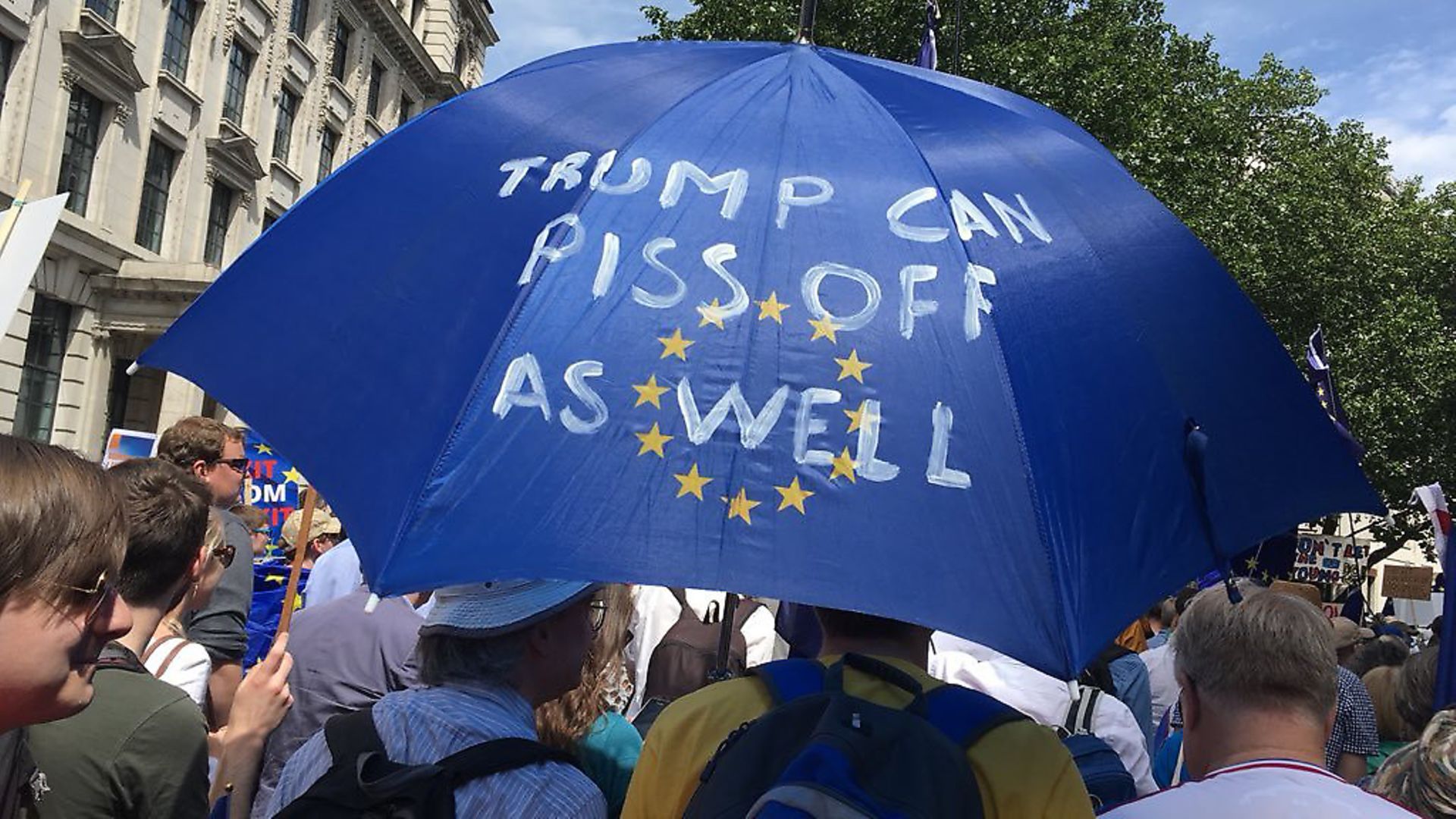
Post-Brexit Britain is pinning its hopes on a US-UK trade deal. Such a deal would open the door to the destruction of the NHS as we know it, says Youssef El-Gingihy
The proximity of the 70th birthday of the NHS to Donald Trump’s impending visit to the UK is a grave reminder of the danger posed to the health service by a future US-UK trade deal. The post-Brexit, Global Britain strategy will mean bilateral, free trade agreements with bigger markets like the US, which will force the NHS and public services to open up to transnational corporations. In this scenario, the bigger markets will dictate the terms.
Outside of the EU, the UK is therefore vulnerable to an aggressive trade deal with a bonfire of regulations around workers’ rights, health and safety and environmental protections.
Theresa May’s hand-holding with Donald Trump during her visit to the US last year is emblematic. The prime minister has refused to rule out the NHS as part of a free trade deal with the States.
Meanwhile, Jeremy Hunt has tweeted that he wants the American and British health sectors to work together. Post-Brexit trade deals will likely be similar to previous international trade agreements. A bilateral US-UK trade deal would ‘liberalise’, or open up, services to transnational investors and companies. This would pose a real threat of exposing the NHS and other public services to further privatisation by corporate US capital. They would likely make public or state ownership difficult.
As Linda Kaucher, a campaigner against the previously proposed Transatlantic Trade and Investment Partnership, between the EU and the US, has previously explained, all trade agreements are effectively an ‘irreversible commitment made at the level of international law, i.e. beyond changes at the level of the UK government or the EU’.
A Trump trade deal could allow US corporations to operate without limits on activities, or on the number of corporations that enter a particular sector. It could afford these corporations the same or even better treatment than British companies. And it would hand them the right to sue the UK government in an international jurisdiction if there was any attempt to limit rights or introduce regulation which might limit corporations’ expected future profits. These are called investor-state dispute settlements (ISDS).
ISDS allows corporate lawyers to sue governments in ‘secretive’ courts. Other trade agreements have already facilitated countless examples of corporations suing governments over measures taken for the public good. Philip Morris sued the Australian government over plain packaging for cigarettes; a Swedish firm sued the German government over the decision to ban nuclear power; Argentina was sued by international utility firms over freezing energy and water bills and has been forced to shell out more than a billion dollars for this and other such claims.
In the first 16 years of the North American Free Trade Agreement (NAFTA), Canada, Mexico and the US faced 66 such claims, costing several hundred million dollars in compensation and legal fees.
This would be a punitive deterrent for government at any level – whether local, regional or national – to reverse privatisation. A Trump trade deal with ISDS clauses would mean that if a future UK government took steps to reverse privatisation of the NHS then they might be sued. In effect, a deal would open contracts and services to American companies and lock them in.
Parliament has just voted in favour of the Comprehensive Economic and Trade Agreement, an EU-Canada trade deal. The arrangement includes a proposal for an ‘investment court system’, or arbitration courts for investors. As Green MEP Molly Scott-Cato has written, all services will be subject to a liberalised trade system unless exempt. This slim exemption would appear to only apply to core government functions, such as law enforcement, the judiciary and central banking.
A Trump trade deal would essentially be based around the principles of extreme free market orthodoxy. Deregulation would water down workers’ rights, health and safety rules and environmental protections. Harmonisation would see regulations in various sectors aligned between Britain and the US in a race to the bottom.
We are already seeing the acceleration and consolidation of NHS privatisation through the introduction of US-style accountable/integrated care models. Such models are being brought in without legislation, and therefore parliamentary scrutiny. They would potentially allow the handing over of 10-15 year, multi-billion contracts for health and social care for whole regions to non-statutory, non-NHS bodies. This paves the way for a two-tier NHS with the expansion of private health insurance for those who can afford it and a basic, third-class ‘Medicaid’ (the threadbare, safety net for the poorest in the US) type of service for those who cannot.
Trade deals are negotiated behind closed doors and are often unaccountable and undemocratic, with little say for groups representing ordinary people. Admittedly, if we had remained in the EU, there would be the threat of TTIP. However, huge anti-TTIP demonstrations and mobilisation across Europe provided a bulwark of opposition, forcing the EU into greater transparency. Post-Brexit Britain will not be in such a strong negotiating position either.
The UK government is disingenuously using the 70th anniversary of the NHS and the announcement of the £20 billion funding to disguise its dismantling and privatisation of the health service. We will all need to be vigilant in the fight to protect our health service if it is to celebrate future birthdays.
Youssef El-Gingihy is GP at the Bromley by Bow centre in Tower Hamlets and author of How to dismantle the NHS in 10 easy steps; an updated, expanded edition is out this summer
















